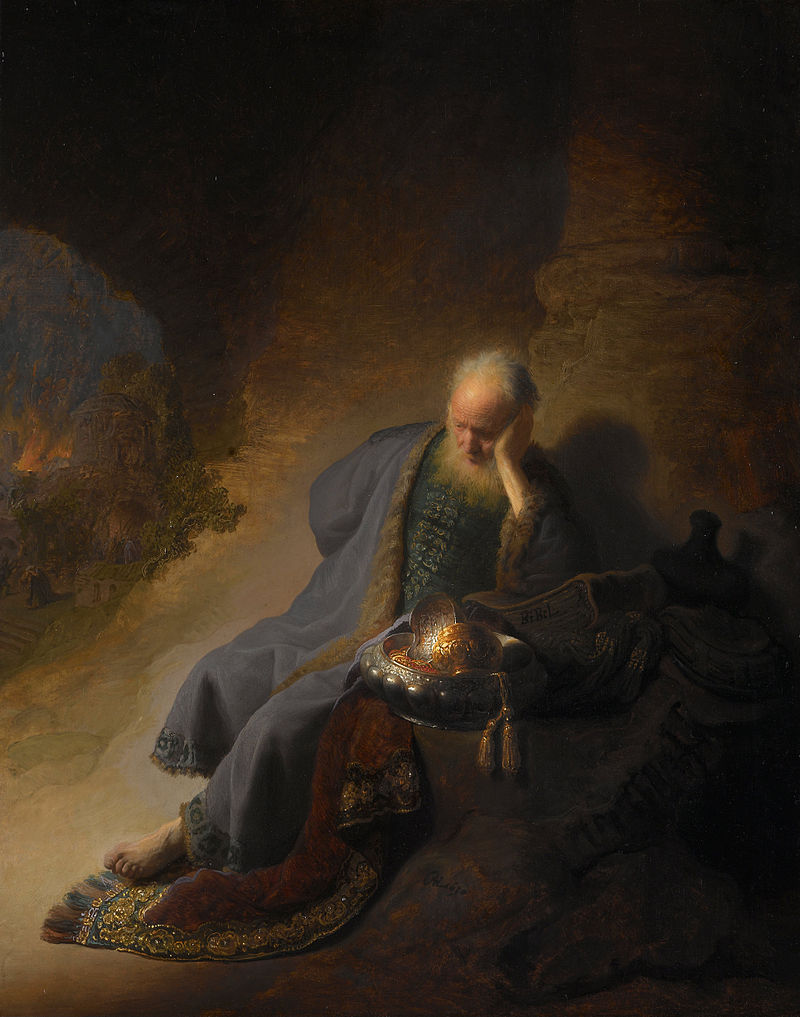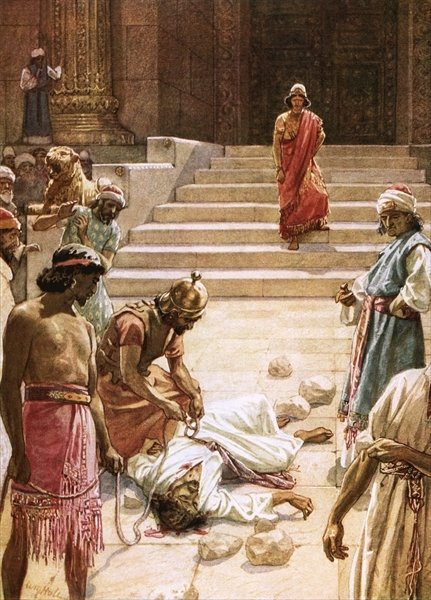
“Jeremiah Lamenting the Destruction of Jerusalem…”
Friday, March 13, 2015 – The last time I did background and color commentary on Daily Office Readings (DORs) was on February 20. That post was The True Test of Faith. It talked about how two different Christians might react if they died, and only then found out that there was no God, no afterlife and no “reward for being good.”
This post will start off with today’s readings: Jeremiah 11:1-8,14-20; Romans 6:1-11; and John 8:33-47. For starters, Jeremiah was known as “the Weeping Prophet,” as shown above.
He is also credited with writing “the Book of Jeremiah, 1 Kings, 2 Kings and the Book of Lamentations.” He is considered a major prophet, quoted often in the New Testament. It has been said that he first “spiritualized and individualized religion and insisted upon the primacy of the individual’s relationship with God.” (As opposed to having to belong to a special group.)
Of particular interest is Jeremiah 11:19, “I had been like a gentle lamb led to the slaughter,” a victim of those who “plotted against me.” The International Bible Commentary added this:
In the plot by relatives and neighbors to kill him Jeremiah prefigures Christ who said that a prophet has no honor in his own country and that a man’s foes shall be those of his own household. (Matthew 10:36 .)
Paul’s Letter to the Romans is the “longest of the Pauline epistles and is considered his ‘most important theological legacy.'” One scholar considered it his masterpiece:
It dwarfs most of his other writings, an Alpine peak towering over hills and villages… Not all climbers have taken the same route up its sheer sides, and there is frequent disagreement on the best approach. What nobody doubts is that we are here dealing with a work of massive substance, presenting a formidable intellectual challenge while offering a breathtaking theological and spiritual vision. (E.A.)
For today, Romans 6:1-11 spoke of “Dying and Rising with Christ.” The IBC said of Romans 6:1-14, that it is “easier to consider the passage as a whole rather than verse by verse.” Paul wrote in part that “all of us who have been baptized into Christ Jesus were baptized into his death.” The gist of the message is that just as Jesus was raised from the dead, by following him “we too might walk in newness of life.” The IBC added this about the new (reborn) Christian:
When he is incorporated into Christ on profession of faith, he is given a personal share in the great events of Christ’s work and transferred from his old existence to a new plane of life.
He is “incorporated,” and given a share in the work of Jesus, including performing greater miracles than He did. (John 14:12.) The new Christian is thus brought to a new plane of life.
Turning to the Gospel, John 8:33-47 tells about Jesus describing the “true children of Abraham.” John 8:31 noted that Jesus addressed “the Jews who had believed him.” He said if they held to His word, they would know the truth “and the truth will set you free.” One of the best-known verses in the Bible, but not without controversy. See The Truth Will Set You Free | Psychology Today (August 2014), compared to The Truth Will Not Set You Free | Psychology Today (May 2012).
The main reading features some arguable witty banter between Jesus and those who “had believed him,” mostly concerning their kinship to Abraham. The banter culminated with John 8:58, featured in the Gospel reading for tomorrow, March 14. That’s where Jesus said, “before Abraham was born, I am!” In turn, “At this, they picked up stones to stone him, but Jesus hid himself, slipping away from the temple grounds.” (See also Stoning – Wikipedia.)
Note that in saying “before Abraham was born, I am” (emphasis added), Jesus was harking back to Exodus 3:14. That was just after Moses had seen the Burning bush, and been told to go back to Egypt to free the Hebrew slaves. When Moses asked God’s name – knowing the Hebrews would ask that question of him – “God said to Moses, ‘I AM WHO I AM.’ This is what you are to say to the Israelites: ‘I AM has sent me to you.'”
This then was why Jesus kept getting threatened with stoning. See John 5:18, “not only was he breaking the Sabbath, but he was even calling God his own Father, making himself equal with God.” See also Leviticus 24:16, “anyone who blasphemes the name of the LORD is to be put to death. The entire assembly must stone them. Whether foreigner or native-born, when they blaspheme the Name they are to be put to death.“
* * * *
On a somewhat related note, the New Testament reading for last Friday, March 6 was Romans 2:25-3:18. A key theme there seemed to be that you aren’t saved by observing the “minutiae” of religious ritual, no matter what the Legalists and/or Fundamentalists say. See also On “another brick in the wall.” The International Bible Commentary said this about Romans 2:25-29:
The hearers of God without God may be compared to a traveller who remains standing under the signpost instead of moving in the direction to which it directs him. The signpost has become meaningless… Being a “Jew” depends not upon rite, race, or written code, but upon an attitude of heart.
The IBC cited Deuteronomy 10:16, Jeremiah 4:4, and Acts 7:51 for that proposition. See also the Pulpit Commentary for Acts 7:51, regarding circumcision as an “outward sign of faith:”
Circumcision was never meant to be an end in itself. The physical mark was meant to be accompanied by a deep spiritual commitment to God. Where commitment was absent, circumcision soon degenerated into ritualism. (E.A.)
See also Romans 2:17-29 | Bible.org. See also the Gospel reading for Saturday February 28, John 4:24, “God is spirit, and those who worship Him must worship in spirit and truth.”
That’s what this blog is about. Trying to get beyond the literal meaning of the Bible, and get to those richer, deeper spiritual meaning of those readings…

The upper image is courtesy of Jeremiah – Wikipedia, the free encyclopedia. The caption reads: “Rembrandt van Rijn, Jeremiah Lamenting the Destruction of Jerusalem, c. 1630.”
The lower image is courtesy of the Wikipedia article Zechariah ben Jehoiada, contained within the article on Stoning. Zechariah was the prophet “who denounced the people’s disobedience to the commandments,” as noted in 2 Chronicles 24:21. (See also Matthew 23:35.) The caption reads: “The Murder of Zechariah by William Brassey Hole.”